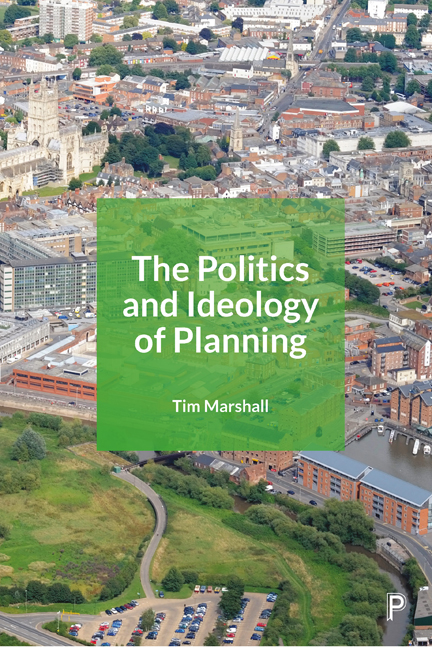Book contents
- Frontmatter
- Contents
- List of figures and tables
- List of abbreviations
- Acknowledgements
- 1 Introducing planning, politics and ideology
- 2 Writing on politics and ideology in planning
- 3 Ideologies in Britain, with initial linking to planning
- 4 Planning history, planning reform and politics and ideology
- 5 Planning expertise and planning law: autonomy from politics and ideology?
- 6 Ideology and politics in government, central and local
- 7 Ideology and politics in professions, lobbying, consultancies and pressure groups
- 8 Communication, the media and deliberation
- 9 Facets of planning action: heritage, local environment and design
- 10 Fields of planning action: housing, economy and infrastructure
- 11 Paths to improving the ideological and political dimensions of planning
- References
- Index
2 - Writing on politics and ideology in planning
Published online by Cambridge University Press: 05 January 2022
- Frontmatter
- Contents
- List of figures and tables
- List of abbreviations
- Acknowledgements
- 1 Introducing planning, politics and ideology
- 2 Writing on politics and ideology in planning
- 3 Ideologies in Britain, with initial linking to planning
- 4 Planning history, planning reform and politics and ideology
- 5 Planning expertise and planning law: autonomy from politics and ideology?
- 6 Ideology and politics in government, central and local
- 7 Ideology and politics in professions, lobbying, consultancies and pressure groups
- 8 Communication, the media and deliberation
- 9 Facets of planning action: heritage, local environment and design
- 10 Fields of planning action: housing, economy and infrastructure
- 11 Paths to improving the ideological and political dimensions of planning
- References
- Index
Summary
Some planning and ideology classics
It is important first to engage with what planning thinkers have said about politics, ideology and planning, as this will also indicate major gaps in this engagement. This review is mainly focused on literature of the last 10–15 years. However it will help to glance briefly at some older classic texts. We could go back to a much-cited article by Foley (1960) on the three ideologies of planning. In fact he refers to the three philosophies of planning, which he identifies as ‘sub-ideologies’. These involve making the goal of planning: reconciling competing demands for land, or improving the physical environment, or seeking directly social objectives. He notes the scope for inconsistencies between the three approaches. While he is a perceptive and influential view of British planning by a well-informed US observer, Foley's framework is primarily a discussion of the goals of British planning, rather than a discussion of any underlying ideological impacts on its activities.
Another early consideration of ideology and planning was in the proceedings of a 1973 conference (Kingston Polytechnic 1973) on Ideologies in Planning. In particular this led to the publication of some intriguing reflections by Patsy Healey (1974) – intriguing because she was not later to show direct interest in the area in her many writings. At that moment she shared the view of this book:
Happily, planning and planners can no longer remain in this condition of ideological deprivation. Challenges both to the ‘non-ideological’ position and to the specific ideologies of planners are closing in from many directions. … Planners can therefore no longer avoid the ‘problem of ideology’, and in many quarters it has been for some time a subject of active discussion … ideology is not something to be feared and rejected, or used as a simplistic banner. It would be intellectually honest and, in the long run, a strength in the face of mounting criticism, if planners and the planning profession attempted to be explicit about the beliefs and limitations embedded in their necessary ideologies. (Healey 1974, p 602)
Healey argued that planners, just like activists, need ideologies in order to act, and so opening up the discussion is necessary to reduce vulnerability.
- Type
- Chapter
- Information
- The Politics and Ideology of Planning , pp. 25 - 38Publisher: Bristol University PressPrint publication year: 2020



